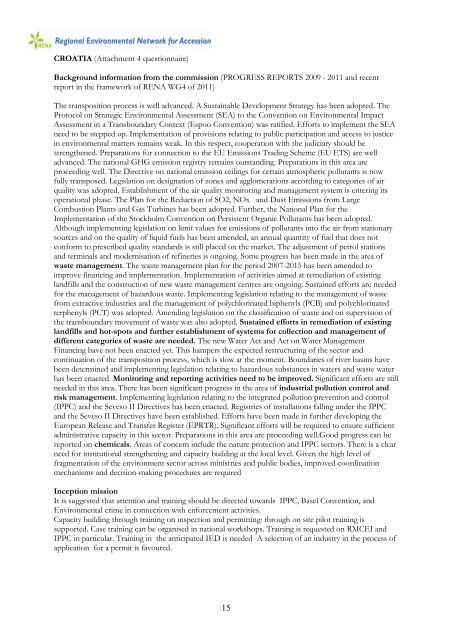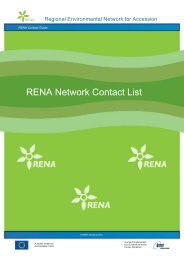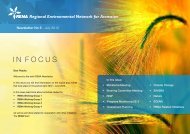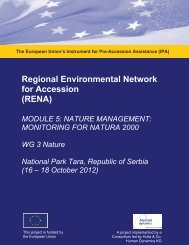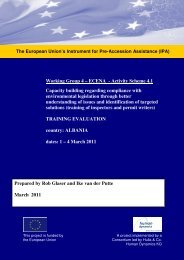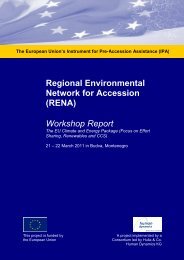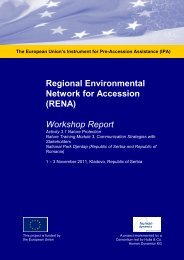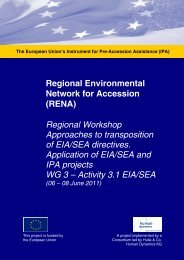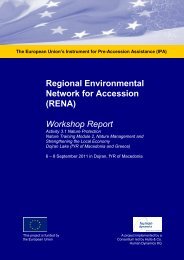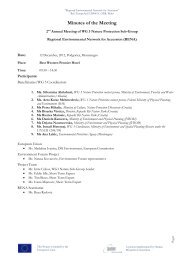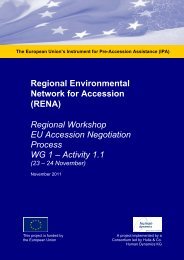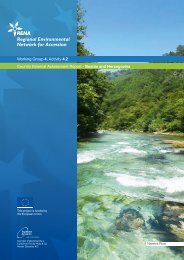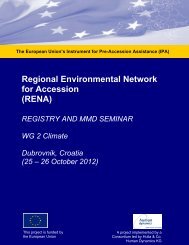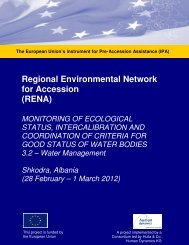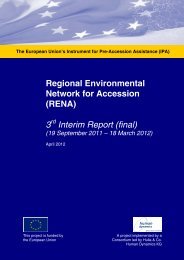RENA WG 4 Dec 2011 final assessment needs ... - Renanetwork.org
RENA WG 4 Dec 2011 final assessment needs ... - Renanetwork.org
RENA WG 4 Dec 2011 final assessment needs ... - Renanetwork.org
- No tags were found...
You also want an ePaper? Increase the reach of your titles
YUMPU automatically turns print PDFs into web optimized ePapers that Google loves.
CROATIA (Attachment 4 questionnaire)Background information from the commission (PROGRESS REPORTS 2009 - <strong>2011</strong> and recentreport in the framework of <strong>RENA</strong> <strong>WG</strong>4 of <strong>2011</strong>)The transposition process is well advanced. A Sustainable Development Strategy has been adopted. TheProtocol on Strategic Environmental Assessment (SEA) to the Convention on Environmental ImpactAssessment in a Transboundary Context (Espoo Convention) was ratified. Efforts to implement the SEAneed to be stepped up. Implementation of provisions relating to public participation and access to justicein environmental matters remains weak. In this respect, cooperation with the judiciary should bestrengthened. Preparations for connection to the EU Emissions Trading Scheme (EU ETS) are welladvanced. The national GHG emission registry remains outstanding. Preparations in this area areproceeding well. The Directive on national emission ceilings for certain atmospheric pollutants is nowfully transposed. Legislation on designation of zones and agglomerations according to categories of airquality was adopted. Establishment of the air quality monitoring and management system is entering itsoperational phase. The Plan for the Reduction of SO2, NOx and Dust Emissions from LargeCombustion Plants and Gas Turbines has been adopted. Further, the National Plan for theImplementation of the Stockholm Convention on Persistent Organic Pollutants has been adopted.Although implementing legislation on limit values for emissions of pollutants into the air from stationarysources and on the quality of liquid fuels has been amended, an annual quantity of fuel that does notconform to prescribed quality standards is still placed on the market. The adjustment of petrol stationsand terminals and modernisation of refineries is ongoing. Some progress has been made in the area ofwaste management. The waste management plan for the period 2007-2015 has been amended toimprove financing and implementation. Implementation of activities aimed at remediation of existinglandfills and the construction of new waste management centres are ongoing. Sustained efforts are neededfor the management of hazardous waste. Implementing legislation relating to the management of wastefrom extractive industries and the management of polychlorinated biphenyls (PCB) and polychlorinatedterphenyls (PCT) was adopted. Amending legislation on the classification of waste and on supervision ofthe transboundary movement of waste was also adopted. Sustained efforts in remediation of existinglandfills and hot-spots and further establishment of systems for collection and management ofdifferent categories of waste are needed. The new Water Act and Act on Water ManagementFinancing have not been enacted yet. This hampers the expected restructuring of the sector andcontinuation of the transposition process, which is slow at the moment. Boundaries of river basins havebeen determined and implementing legislation relating to hazardous substances in waters and waste waterhas been enacted. Monitoring and reporting activities need to be improved. Significant efforts are stillneeded in this area. There has been significant progress in the area of industrial pollution control andrisk management. Implementing legislation relating to the integrated pollution prevention and control(IPPC) and the Seveso II Directives has been enacted. Registries of installations falling under the IPPCand the Seveso II Directives have been established. Efforts have been made in further developing theEuropean Release and Transfer Register (EPRTR). Significant efforts will be required to ensure sufficientadministrative capacity in this sector. Preparations in this area are proceeding well.Good progress can bereported on chemicals. Areas of concern include the nature protection and IPPC sectors. There is a clearneed for institutional strengthening and capacity building at the local level. Given the high level offragmentation of the environment sector across ministries and public bodies, improved coordinationmechanisms and decision-making procedures are requiredInception missionIt is suggested that attention and training should be directed towards IPPC, Basel Convention, andEnvironmental crime in connection with enforcement activities.Capacity building through training on inspection and permitting: through on site pilot training issupported. Case training can be <strong>org</strong>anised in national workshops. Training is requested on RMCEI andIPPC in particular. Training in the anticipated IED is needed A selection of an industry in the process ofapplication for a permit is favoured.15


